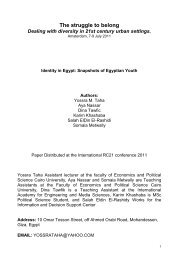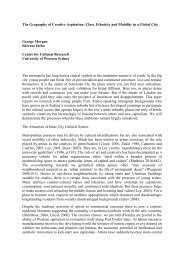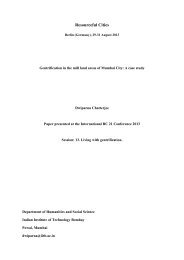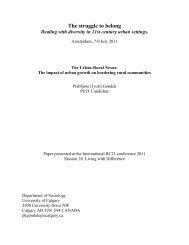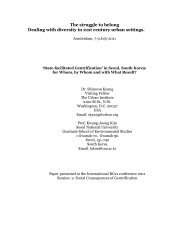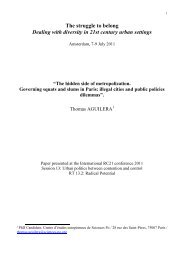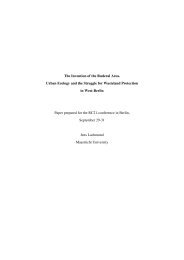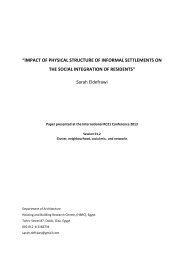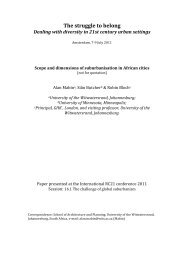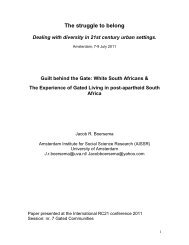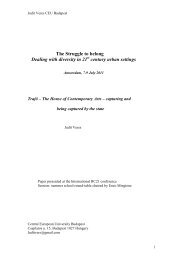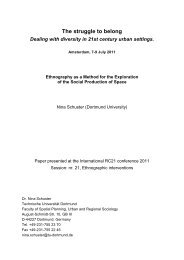Fragmentation as a threat to social cohesion - RC21 ORG ...
Fragmentation as a threat to social cohesion - RC21 ORG ...
Fragmentation as a threat to social cohesion - RC21 ORG ...
You also want an ePaper? Increase the reach of your titles
YUMPU automatically turns print PDFs into web optimized ePapers that Google loves.
ambiguity of the term. As a new analytical term, the theoretical and empirical validity<br />
of fragmentation concerning <strong>social</strong>, economic, political, and spatial structures is not<br />
yet clear. To shed some light on the term <strong>as</strong> a conceptual <strong>to</strong>ol, our paper addresses<br />
fragmentation empirically in the context of Brazilian cities, focusing on the daily life in<br />
its apparently most “<strong>threat</strong>ening fragments”, the favel<strong>as</strong>. Thus, we will critically<br />
question if and how fragmentation is produced in daily <strong>social</strong> practice. Through their<br />
everyday-life practices, favela-dwellers connect different living and working realities<br />
(e.g. domestic workers, doormen). These de fac<strong>to</strong> existing different realities cannot<br />
be seen <strong>as</strong> disconnected, but must be analyzed with regard <strong>to</strong> their interrelations.<br />
Speaking of fragmentation, though, involves the risk of conceptualizing individual<br />
fragments by their disconnections rather than by their connections. Single fragments<br />
thereby are being evaluated differently in terms of their possible <strong>threat</strong> or not <strong>to</strong> <strong>social</strong><br />
order.<br />
1. Conceptual reflections – the fragment <strong>as</strong> witness/evidence, representation<br />
and indica<strong>to</strong>r<br />
Reviewing <strong>social</strong> science literature on the term or engaged with the phenomenon of<br />
fragmentation, the abundance of different usages is striking. Francoise Navez-<br />
Bouchanine (2002a, b) h<strong>as</strong> offered a rich overview of the his<strong>to</strong>ry of the term itself and<br />
the different forms of understanding. She distinguishes between approaches <strong>to</strong><br />
fragmentation <strong>as</strong> a general <strong>social</strong> or societal phenomenon, the fragmentation of<br />
urban form <strong>as</strong> a physical-spatial and <strong>as</strong> a socio-spatial phenomenon, and political<br />
fragmentation (Navez-Bouchanine 2002b). In the first c<strong>as</strong>e, we might think of<br />
fragmentation <strong>as</strong> a new or newly accentuated term for <strong>social</strong> structures. The second<br />
and third relate <strong>to</strong> morphological, terri<strong>to</strong>rial or geographical structures and how they<br />
again relate <strong>to</strong> <strong>social</strong> structures. The fourth, sociologically speaking, analyzes<br />
decentralizing changes in power relations. If we look at the current <strong>to</strong>pics or fields of<br />
<strong>social</strong> science research that refer <strong>to</strong> fragmentation <strong>as</strong> one of the defining<br />
characteristics and that coincide in a number of ways, we may find four main are<strong>as</strong>:<br />
research on globalization, on new media and the so-called information society, urban<br />
studies, and development theory. Still, fragmentation is not a new term – it appears<br />
<strong>to</strong>gether with conceptualizations of pluralization and differentiation of modern<br />
societies long before it experienced a renaissance within theorizations of late, radical<br />
or reflexive modernity and post-modernities.<br />
When dealing with a term that suffers from multiple usage and seems so difficult <strong>to</strong><br />
gr<strong>as</strong>p, it comes <strong>as</strong> a useful <strong>to</strong>ol <strong>to</strong> reflect upon its etymology <strong>to</strong> concentrate on its<br />
original meaning, in order <strong>to</strong> avoid connotations or metaphorical meanings for a<br />
moment: Fragment (Latin fragmentum), of course, means “broken piece”, <strong>to</strong> fragment<br />
(Latin frangere) “<strong>to</strong> fall <strong>to</strong> pieces”, or simply “<strong>to</strong> break”. <strong>Fragmentation</strong>, therefore,<br />
refers <strong>to</strong> both, the fragment <strong>as</strong> a result of the cleavage and the process of breaking<br />
in<strong>to</strong> pieces. The fragment appears <strong>as</strong> part of an original entity which may no longer<br />
appear <strong>as</strong> such. There is, we might conclude, a dialectic relation between<br />
deconstruction and reconstruction (Brunner 1997, 13), the fragment evidencing a<br />
former, deconstructed entity, representing a current state or at le<strong>as</strong>t its perception,<br />
and indicating a process of reconstructing a newly emerging pattern. The connecting<br />
<strong>as</strong>pect between p<strong>as</strong>t, present and future is (<strong>social</strong>) heterogeneity: it may not only be<br />
seen <strong>as</strong> a consequence of fragmentation, but also <strong>as</strong> its cause (cf. Holtz-Bacha<br />
1998).<br />
2 Deffner, Hoerning: <strong>Fragmentation</strong> <strong>as</strong> a Threat <strong>to</strong> Social Cohesion?




